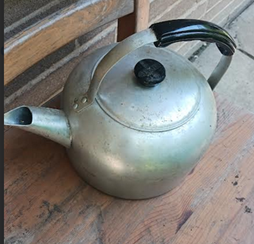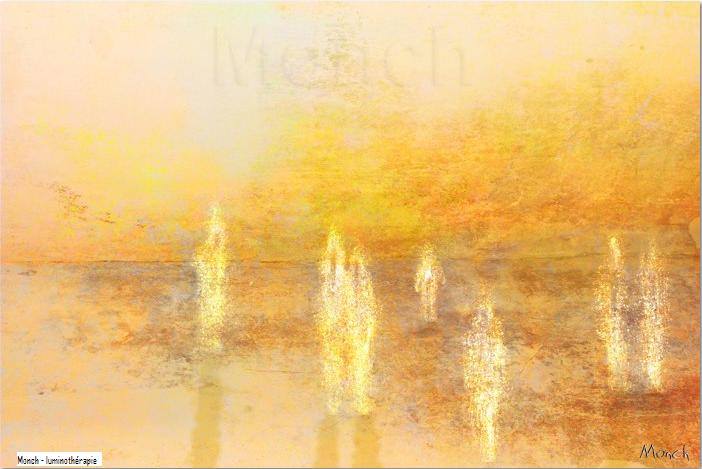The Pathos of Pots and Pans

How I Came to Sell Her Cookware
As some of you may know, I am a bookseller dealing in antique and second hand books. As such, I am often contacted by set dressers wanting a certain type of book or ‘look’ for their sets.
While conversing recently with a set designer, she mentioned that the film’s historical crew were in the process of set dressing for a film that takes place in the early 1950s. The settings where the scenes take place are middle- to lower middle-class apartments and they were seeking original vintage aluminum pots and pans for the kitchen areas of the film.
Consequently, I sold a small set of late 1940s Wear-Ever pots and pans for a movie set.
So Much Stuff and the Wear-Ever Pans
My mother died more than 20 years ago. As an only child, I inherited all her belongings, which included her kitchenware. Some I continue to use, many ended up in the basement or the garage. Some items I sold or donated. I’ve released, re-homed, sold, donated, or gifted books, clothing, knickknacks, appliances, furniture and more. Yet I still have a ridiculous amount of her possessions.
Among those items I kept were her Wear-Ever aluminum pots and pans, which she acquired when she married in the early 1950s. They are certainly not artifacts worthy of velvet cushion reverence. I have never once used them since she died. I hated those pans, even when I was living with my parents as a child and teenager. I hated the flimsiness of some, the harsh metallic surface of others.
She used those pans for 60 years, every single day. She used metal utensils to stir whatever she was preparing, and I recall how the sound and feel of metal against aluminum would set my teeth on edge, just like fingernails scraping a blackboard. Even now, writing and thinking about it gives my teeth a kind of shivery muscle memory of distaste, like biting down on tinfoil.
She cooked everything in those pans. Including tomato-based meals, which I had learned early on in home economics class was a ‘no-no’. When I told her she should never cook tomatoes in aluminum, she cast me an uninflected glance of disinterest combined with low-level disdain (one of her specialty looks — not easy to achieve, yet devastatingly effective). She quickly retorted that she had been doing it for years, I had been eating her meals, and everybody seemed perfectly alright. Then she would turn her gaze back to stirring whatever she was preparing.
So, I sold the pots and pans, along with a jaunty Wear-Ever aluminum kettle that I had only used for storing and scattering bird seed. Maybe I got a good price for them (as collectables), maybe I didn’t. But that isn’t the issue.
It’s a Tug, a Pang, and Guilt
What is oddly and startlingly at issue is the degree and intensity of the regret, guilt and emotional turmoil the selling of this cookware has created.
I didn’t use the pans. They were gathering dust and spider webs at the back of the garage. I would never use them and I don’t know anyone who would. I certainly was not honouring the memory of my late mother by storing her pans in the garage.
Who knows whether she even liked the pans? Me, I have a silly amount of — can we say “affection”? — for some of my cookware; but I like cooking, and my mother didn’t. What she did have was a possessive and acquisitive nature, and she considered her property to be her property. Knowing this trait (which she elevated to the level of an ethos) did not prevent me from disposing many of her other possessions. Some gave me a twinge of regret, a whiff of nostalgia, but nothing more significant.
These damned pots and pans have been tugging persistently at my soul since I watched them get packed into the back of the buyer’s car and driven away. Maybe it’s the quotidian nature of these objects that keeps nudging my heart. Perhaps, in part, it was the transience of their existence.
Ubi Sunt
In medieval European poetry, there is a rhetorical style called “Ubi Sunt”, which is Latin for “Where Are They?”. These poems typically put forth a series of questions about the fate of the strong, the beautiful, and the splendid, and they ponder the transitory nature of life and the ultimate death of all things (people, animals, gods, and objects).
The Anglo-Saxon poem, "The Wanderer", is a good example of the genre:
Hwær cwom mearg? Hwær cwom mago? Hwær cwom maþþumgyfa?
Hwær cwom symbla gesetu? Hwær sindon seledreamas?
[…] Hu seo þrag gewat,
genap under nihthelm, swa heo no wære
Where is the horse gone? Where the rider? Where the giver of treasure?
Where are the seats at the feast? Where are the revels in the hall?
[…] How that time has passed away,
grown dark under cover of night, as if it had never been.
(Robert Diamond translation)
Flotsam, Jetsam, and Lagan
Sometimes I think of the companion terms, flotsam and jetsam. They are two very distinct things. Flotsam is wreckage from a ship, which is often later found washed up ashore, or things lost overboard. Jetsam, on the other hand, is more intentional; it is what is specifically thrown overboard, often to lighten a vessel’s load.
There is also a lesser-used term: lagan. It refers to jetsam that is marked with a buoy so it can be found later.
When my Mother died, her exit was relatively rushed. Her things were left behind, exposed, and in a certain sense, became flotsam.
What We Leave Behind
I think, ultimately, we will all leave behind things both valuable and this debris, and our wills and last instructions take our flotsam and treat it as lagan. On the other hand, with so much “stuff”, both that which may be valuable and that which is just debris will be intermixed. Even with a detailed will, not everything will be itemized. Your books, your collectables, your furniture, your wristwatch, your money, your battered slippers, your moth-eaten sweater, your money, your childhood plush toy, a packet of old letters, your bills paid in full, keys to who knows which lock: All will be found, and possibly be puzzled over. Some items will be tossed, some distributed, some tucked away in that place in your home — the garage, the basement, the spare room, the junk drawer — where you accumulate things for any number of reasons. It could be nostalgia, a sense of “this might come in handy one day”, “I might sell this for good money someday”, “my kids (or grandchildren) might want this at some point”. Or you might simply be overwhelmed and put off the decision-making until some future date.
My mother’s pots and pans were not flotsam or jetsam. She used them until she died. They were also not lagan, in that I received no specific instructions about them. Likely she would have wanted me to use them, even knowing quite well that I never would. Perhaps she didn’t care, but given what I know of her, she probably would have. After all, she touched and used them every day. And this, I believe, is what tugs at my heart.
Destiny for a Diva
My mother was a musician, a performer by nature, and a bit of a diva. She relished the spotlight, would never miss an opportunity to perform. She would feign modesty or allow herself to be “faux-cajoled” into playing a piece on the piano or singing a soprano operatic aria. She craved the attention and was never happier than when she was performing.
Perhaps… perhaps… just maybe, she will find a small bit of satisfaction knowing that her workaday Wear-Ever pots and pans play a part in a performance. If I can convince myself of this, my heart may let go of the aptly named Wear-Ever cookware.
Would you like to read other posts? If so, please click the Home Page link below:

You, Dear Reader, are much needed and appreciated.
Everything written requires a reader to make it whole. The writer begins, then you, dear reader, take in the idea and its image, and so become the continuation of its breath. Please subscribe so that my words can breathe. Consider this my hand, reaching out to yours.
